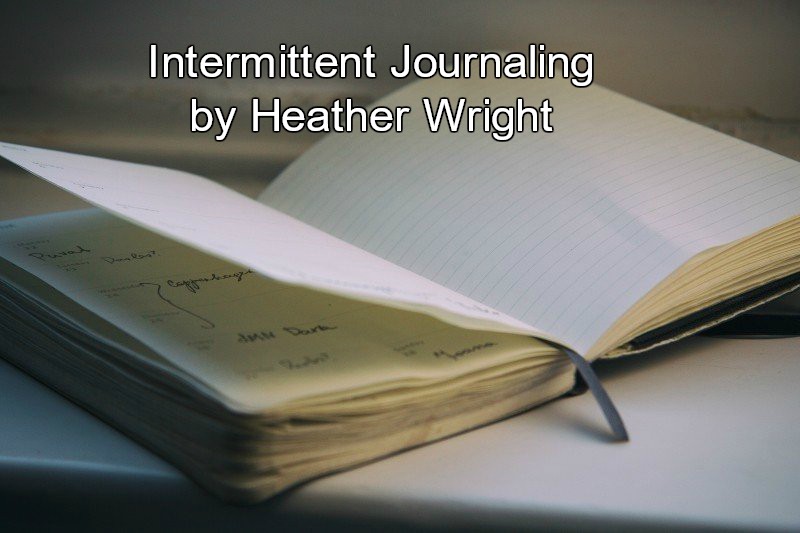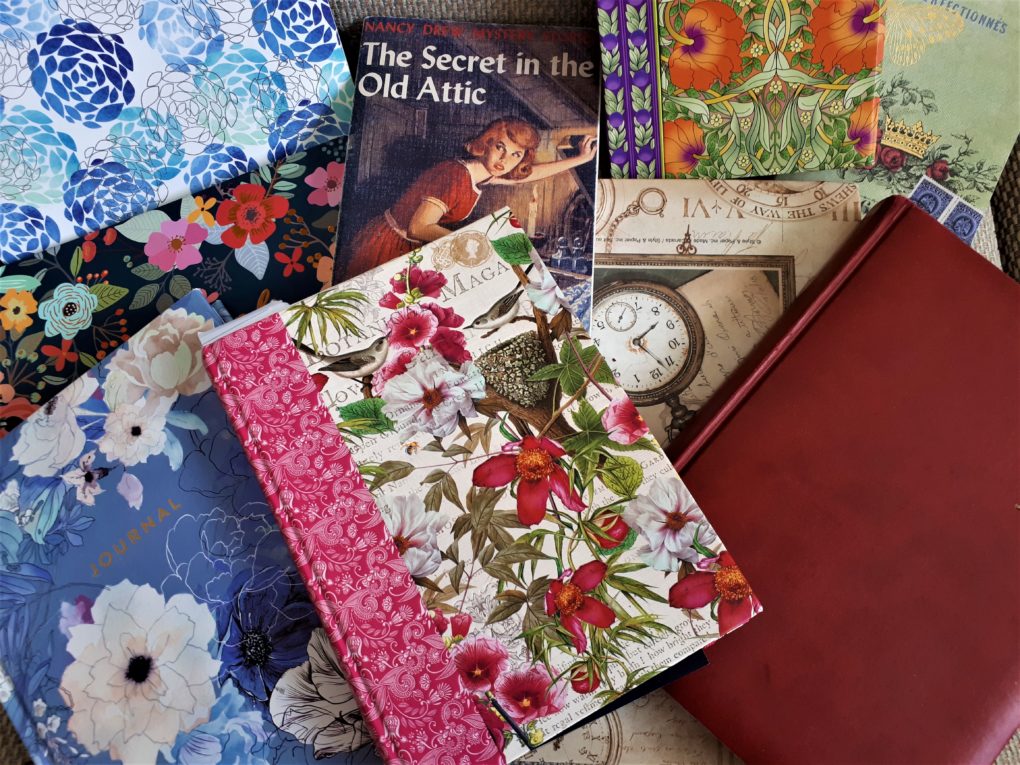by Heather Wright, @hwrightwriter
Ever since I got a pink diary with a lock and key for Christmas when I was eleven, I have tried to keep a daily journal—I really have. But, no matter what my intentions, I have never managed to succeed. And once I became a writer, it seemed even more important that I keep a daily journal. I mean, it’s what writers do, right?
Finally, I stopped trying. More importantly, I stopped feeling less than a ‘real writer’ or guilty because I didn’t write in my journal every day. Journaling has a definite place in my writing life, and when I need to, I approach my journal with a purpose and enjoy the benefits that journaling brings.
Here are the times when I turn to my journal—sometimes daily, sometimes not. These journaling times are short-term, focused, and reap rewards.
Journal when the creative well needs filling.
I have writer friends who always have an abundance of story ideas. They bemoan the fact that there will never be enough time to write them down. Sadly, I’m not like that. When I search my brain for inspiration and get crickets, that’s when the journal comes out. I commit to a week of daily journaling, and if I’m still looking for inspiration at the end of the week, I’ll try another week.
My best time to access random story ideas is before bed. I quickly jot down my to-do list for the next day, so those I-must-remembers are cleared out of my head, and then, because I’m a bit tired and dozy, I just let my brain wander. I let characters walk in and talk or move around, and I write it down. I’m under no pressure to make a story out of these ramblings right now. I just let them be. If you’re not a lark like I am, then mornings may be the best time for you to welcome that half-dreamy state where stories can happen.
Yes, some dross lands on the page, but there’s gold, too, and I’ve found many stories and book ideas using this process.
Journal when life gets complicated.
Journaling helps me when life gets ultra-busy, stressed, seemingly out of control—you know what that feels like. Your family and friends will listen and care, but sometimes you just want to spare them the pity party. When deadlines loom, illness drops by, cars decide to stop running, and the people around me—my family and co-workers—are depending on me, I give myself the gift of journaling.
Journaling is my date with myself, to rant, make lists, write whatever I need to write to houseclean the day’s mental and emotional clutter and move on. Like, Elsa, I “let it go” on the journal page. With the mess acknowledged and out of the way for a while, I can focus on my deadline and find the creative answers I need to get the words on the page.
Journal when the blank screen doesn’t cut it anymore.
These days, I compose almost all my work on the keyboard, but that wasn’t always the case. When I started to write stories (mysteries, of course, featuring Nancy Drew), I used pen and paper. Now, when I get stuck on a project, I go to my journal to unblock the problem, and words begin to flow again. It’s like my creativity was hot-wired to having a pen in my hand and feeling it move along paper.
If all your journaling is going to be done with your keyboard, then break away from the blank white page. Color the pages on the screen, add photos, even write on photos. In Word, click on Page Color under the Design Tab and have fun. Make your pages no longer full of scary white space, but rather, a just-for-you zone to play with words.
Journal when it makes you happy.
My friend’s son coined a word many years ago: joywriting. Journals are for that, too. My favorite day of the month is the one in which I invent new writing prompts for my blog. I could sit down at my laptop and do this, but I get more joy from sitting in my living room with a cup of coffee and my journal and letting my mind be inventive. This routine makes me happy. Building a routine around your journal time can give you a much-needed, calm pause in your day. Light a candle, say a prayer, play your favorite music, make that special tea or coffee and let your creativity, thoughts, and feelings flow.
Journaling isn’t for everybody every day, but I hope that you find, as I did, a place for journaling in your writing life—even intermittently–and enjoy the benefits it can bring.
 Heather Wright is Amazon bestseller, writing coach, and workshop leader. She loves working with writers of all ages, helping them develop the writing skills that will make their work shine. Her website is full of writing prompts and resources for writers and their teachers. Heather is also a freelancer writing about everything from PVC pipe to orchids to Canadian history.
Heather Wright is Amazon bestseller, writing coach, and workshop leader. She loves working with writers of all ages, helping them develop the writing skills that will make their work shine. Her website is full of writing prompts and resources for writers and their teachers. Heather is also a freelancer writing about everything from PVC pipe to orchids to Canadian history.
Heather has written many books (and journals) for writers. Her recent works include Writing Mysteries: A Take-Action Workbook, Writing Romance: A Take-Action Workbook, and Writing Fantasy: A Take-Action Workbook. You can see all her books here.
Writer @hwrightwriter on the Advantages of Intermittent Journaling: Click To TweetPhoto on Best Running


“Journaling is my date with myself,” – best line ever!
I love this post and the suggestions. Started a gratitude journal many years ago. Haven’t written in it in eons, but about to start again, armed with my favourite fountain pen. You are right – pen and paper do, indeed stimulate creativity!
Yes, to the fountain pen, Ceci!
I get crickets when searching for story ideas! More like a plague of locusts. Maybe I do need to try a journal.
I really do find that it helps. I go to a coffee shop with my journal and tell myself that I’m not leaving until I get something constructive on the page–a new story idea, a breakthrough in my current creative muddle, whatever my goal is. It works every time. I don’t know if it’s the change of scene that makes a difference, but I’m not going to argue with the results. (I know it’s not the coffee as I can only drink decaf. :) )
Journaling has a lot to recommend it. I’m glad you’re focusing on it here. One of the things that makes journaling a useful tool, in my opinion, is that it’s good, regular, writing practice. It keeps those ‘muscles’ flexing.
I agree. It’s easier to get into my own projects when I’ve warmed up by journaling. Journaling is editor-free writing, so when you’re in that zone before approaching your own work, your critical voices have been quieted for a while, leaving you free to “get ‘er done.” I find that drawing and coloring also give me that quiet space before I start my writing.
I keep a to-do list but it’s been a while since I journaled.
I couldn’t live without my to-do list. I like to fill it out at night, so I’m not lying awake telling myself not to forget to do something the next day. Journaling is a can’t-lose proposition. If it doesn’t work for you, you’re only out a little paper and ink or some time at the keyboard. And if it works for you, you’ve found a new tool for your writer’s toolbox. I hope you give it a try!
I don’t have tons of story ideas either. Maybe I’ll try writing in a journal to help. Thanks for the tips.
I hope you give it a try. It has certainly helped me. I’ll put in a plug, too, for the writing prompts on my website. Check these out and see if they spark a story or two. http://www.wrightingwords.com/writing-starters/
Thanks so much for the great post, Heather! This makes me feel better about my own sporadic journaling. I started in first grade and had a diary that I wrote in daily until college. Definitely more spotty the last 25 years or so! This post makes me feel less-guilty. :)
We can all do with a lot less guilt! We’re women–guilt is waiting around the corner for us every day. Journal guilt is one we should be able to let go of, so we can enjoy our time with pen and paper. Yay for one less “should have!” And thanks again for inviting me to be a guest on your blog!
Hi Heather,
You wrote, “Your family and friends will listen and care, but sometimes you just want to spare them the pity party.”
I never thought about a journal in that way before, but it’s so true. A journal gives you a place to vent, so you can spare burdening others. What a wonderful benefit. Thanks for reminding me of that!
You’re welcome! I find it a real benefit to just dump it all on the page. These aren’t pages I go back and read. I usually end up tearing them up when I’m done, not wanting to give whatever emotions I was dealing with at the time any more power now that they’re out of my system. There’s a lot of information out there about journaling as therapy. I can see it being a valuable resource.